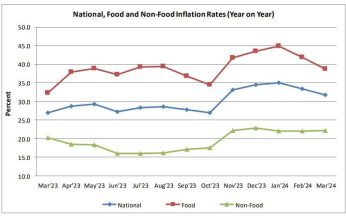AfDB approves K7bn to boost employment
 At a time when unemployment levels are escalating due to the dire economic situation, the African Development Bank (AfDB), has approved a five-year $41 million (K7 billion) to improve employment prospects for graduates and other students through training and skills development.
At a time when unemployment levels are escalating due to the dire economic situation, the African Development Bank (AfDB), has approved a five-year $41 million (K7 billion) to improve employment prospects for graduates and other students through training and skills development.
The pan-African bank’s funding also comes at a time when most of the graduates from the University of Malawi (Unima) and other colleges are finding it tough to secure employment due to stringent requirements from the job market, particularly experience and the tough economic environment in which the private sector is not creating jobs.
The financing, to support efforts of the Malawian Government in improving the quality and relevance of skills for job creation and employability, is a mix of loans and grants from the AfDB’s African Development Fund and its Nigerian Trust Fund. Malawi Government has contributed$ 4.1 million (K688 million), says the bank in a statement.
“The main beneficiaries of the project will be students and teachers in key institutions of higher education and Technical, Entrepreneurial, Vocational Education and Training (Tevet) in Malawi. Other beneficiaries will include secondary school graduates, teaching staff and prospective employers,” reads the AfDB statement.
The programme, during its five-year life span, will offer increased access to Tevet and higher education and also target education institutions with good links to employers.
“There will also be improved monitoring and evaluation systems in the beneficiary institutions linked to relevant government ministries. It will also include impact evaluations to measure the project’s effectiveness in boosting participation and retention in Tevet and higher education,” reads the statement posted on the bank’s website.
Malawi’s unemployment rate is believed to be high. The National Statistical Office (NSO) commissioner Charles Machinjiri said earlier that it is difficult to compute unemployment figures in Malawi due to the lack of a national identification system to track people without
jobs.
In developed countries, high unemployment figures are a big issue that could sway voters during an election.
But Machinjiri said, unlike in developed countries, anybody who is unemployed registers with the employment bureau and their figures are readily available and updated every month.
“In this way, it becomes easy to compile data on how many people are employed or not, where they are located and what kind of jobs they are doing.
“For instance, in developed countries when one is out of the job, they also register with the government to access the unemployment benefit funds,” he said.
In Malawi, the unemployment figures are meaningless, he said, because 85 percent of the population live in the rural areas with only 15 percent residing in urban areas.
Unemployment figures usually are a microcosm of the health of an economy to generate jobs.
The AfDB project, is in line with the Malawian Growth and Development Strategy (MGDS) for 2011 to 2016, the National Education Sector Plan for 2008 to 2017, and the AfDB’s medium term strategy for 2008 to 2012 and the strategy for higher education and science training.





